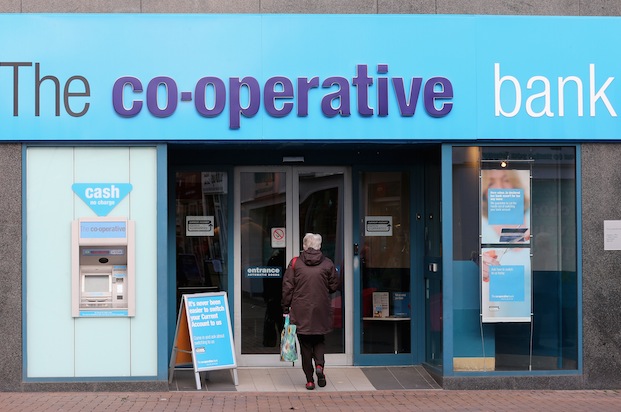The naughty Reverend Flowers will be a comic footnote in the history of the financial crisis — but no more than that. In terms of making ministry relevant to modern congregations, you’ve got to take your hat off to a man of the cloth who knows his ‘Charlie’ from his ‘ket’ (for the uninitiated that’s a horse tranquilliser) and likes to unwind after a tough select committee hearing with a ‘two-day, drug-fuelled gay orgy’. But it must be obvious that neither the FSA nor his own colleagues thought him anything other than a figurehead when he emerged through the Co-operative hierarchy to become a director of the Co-op Bank in 2009, and its chairman a year later.
Vastly more significant in the bank’s crash was the role of chief executive Neville Richardson — who had run the Britannia Building Society which the Co-op absorbed in 2009, and whose claim that he left the group in good shape when he resigned in 2011 has been vigorously disputed by Andrew Bailey, head of the Bank of England’s Prudential Regulatory Authority. Worth scrutiny too is the risk committee of the Co-op Bank board, chaired since last year by one of the Bank of England’s own alumni, Merlyn Lowther, and before that by Peter Harvey, a former senior banker at Barclays and, come to think of it, the eager credit analyst I used to sit next to there 30 years ago. Paul Flowers has given us a good laugh, but it’s the professionals who must carry the can.
The north goes more global
Forget tired old ‘north-south divide’ stories: it’s all happening up here. At a business conference in the grand hall of the Food and Environment Research Agency at Sand Hutton, I learn that nearby York now markets itself as ‘the Northern Tiger’ and aspires to be a ‘Top Ten European city economy’, while ‘World Trade Centre Hull & Humber is the “go to” destination for international trade’. As a gift for collectors of northern clichés, there was even news of a Headingley–based flat-cap maker, Kempadoo Millar, that is exporting to Milan. And then there’s Helperby, a North Yorkshire village whose biggest news was its rebuilt cricket pavilion until its name was borrowed by a bioscience venture called Helperby Therapeutics.
The connection is Sir Anthony Milnes Coates, fourth baronet of Helperby Hall, who also happens to be professor of medical microbiology at St George’s Hospital in London and an expert on ‘superbugs’ such as MRSA which have developed the capability to survive exposure to multiple antibiotic drugs — creating a potential catastrophe ‘to rank with terrorism and climate change’, as UK chief medical officer Dame Sally Davies has melodramatically warned.
Coates’s team has developed an Antibiotic Resistance Breaker compound which in early-phase trials has shown it can boost the effect of existing antibiotics against highly resistant bacteria. And his company has just signed a licensing agreement with Cadila Pharmaceuticals, headquartered in the Indian city of Ahmedabad, which will take the product through further trials and approvals to commercialisation. Praised by David Cameron during his recent trip to India, the deal is another example (like CMT, which I wrote about on 21 September) of what British boffinry can do with global capital. And it has not just a Yorkshire name but a Yorkshire brain behind it.
Whenever I visit the opulent but disconcertingly secure government research facility at Sand Hutton, incidentally, I wonder what they’re all up to in there — though I’ve never believed the rumour about breeding a half-man-half-sheep chimera. If its laboratories ever invent anything as useful as so many of our cash-starved start-up private-sector ventures have done, it will surely be a ripe candidate for privatisation.
After the typhoon
The Philippines government has been widely criticised for the inadequacy of relief efforts in the aftermath of Typhoon Haiyan, amid allegations that politicking and corruption have impeded emergency services and delivery of international aid. It might be worth pausing to ask how our own county councils would cope with the passage of the strongest tropical cyclone ever to make landfall — but I’m also reminded of the impressions I formed for myself when I was a regular visitor to Manila in earlier days.
That was during the presidency of Corazon Aquino, mother of the incumbent Benigno Aquino III and heroine of the ‘People Power’ revolution of 1986 which put an end to the US-backed regime of Ferdinand Marcos and his ridiculous wife Imelda. Mrs Aquino’s husband, Benigno II, had been shot dead at Manila airport by soldiers loyal to Marcos as he tried to return from exile to lead the opposition in 1983; I once spent an unhappy afternoon stuck at that very boarding gate, contemplating the failures of democracy in Asia.
Buffeted by big money and military interests, the Aquinos (rich landowners themselves) have taken stands against corruption, but the country remains an example of what Daron Acemoglu and James Robinson, in Why Nations Fail, labelled an ‘extractive’ regime — one that is ruled in the interest of an elite that controls economic resources and has scant interest in sharing wealth or promoting progress. Far more admirable than the people who run the country are the millions of hardworking, often exploited Filipino expats — maids, waiters, seamen, construction workers — whose remittances feed their families at home.
I have even more uncomfortable memories of stepping over sleeping mothers and children on the pavements of Manila’s nightlife district, and of attending a bankers’ party in a grotesque mini-palace built by Imelda for the visit in 1981 of Pope John Paul II, who according to legend refused to set foot in it. Progress has now been knocked back again by the forces of nature, and you will perhaps sense a note of atonement when I say that we should not let tales of misappropriation or incompetence deter us from sending donations, via dec.org.uk.
Got something to add? Join the discussion and comment below.
Get 10 issues for just $10
Subscribe to The Spectator Australia today for the next 10 magazine issues, plus full online access, for just $10.
You might disagree with half of it, but you’ll enjoy reading all of it. Try your first month for free, then just $2 a week for the remainder of your first year.















Comments
Don't miss out
Join the conversation with other Spectator Australia readers. Subscribe to leave a comment.
SUBSCRIBEAlready a subscriber? Log in